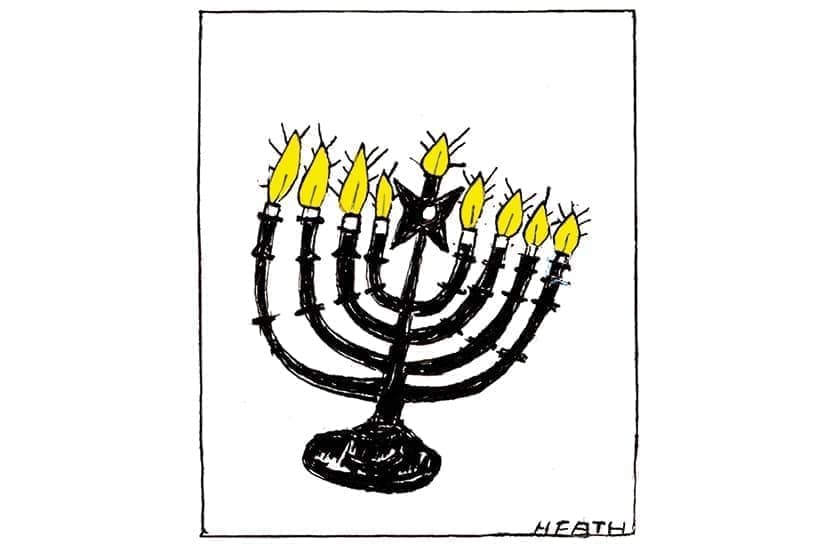Reactions to the recent passing of F.W. de Klerk transported me back to my childhood in South Africa. The horror of apartheid was a frequent topic of conversation in our family. My uncle’s law firm, Witkin, Sidelsky and Eidelman, pioneered the employment of black people and gave Nelson Mandela his first job as a clerk, in defiance of the accepted practice at the time. My mother was the principal of the only training college for black pre-school teachers and my father, a rabbi, made pastoral visits to Robben Island. We were all-too-aware of the urgent need to dismantle the structural racism that plagued the country. When de Klerk and Mandela worked together to do exactly that, the joy was tempered by the knowledge that it had taken far too long. For many, understandably, de Klerk remains the embodiment of a society built upon prejudice and hatred, but I found him to be a man of courage and sincerity. How many leaders today would be ready to act as he did, forming a government with a sworn political opponent? In our ever-increasingly polarised world, it is populists who are often rewarded at the ballot box rather than those who stand ready to compromise. Perhaps one aspect of de Klerk’s complicated legacy is the reminder that, in politics, the ability to make radical concessions need not always be considered a weakness.
I would never have thought that I’d be giving several addresses to Muslim majority audiences, including one at the Seventh Abu Dhabi Forum for Peace, which operates under the auspices of Shaykh Abdallah bin Bayyah of the UAE, one of the defining voices of contemporary Islamic scholarship. As anyone engaged in striving to improve Jewish-Muslim relations will know, this year has seen an unexpected sea change following the signing of the Abraham Accords in August 2020. Soon thereafter, the United Arab Emirates, Bahrain, Sudan and Morocco all normalised ties with Israel. The floodgates opened. Jewish tourists and businesspeople poured in. Within weeks, there was even a kosher restaurant in Burj Khalifah. The fruits of peace and harmony are sweet.
I have just affixed a mezuzah on the doorpost of my new office. It’s a scroll with handwritten extracts from the Bible, which we place in the doorways of Jewish buildings. Of the numerous occasions on which I’ve been honoured with the task of affixing a mezuzah, one experience above all comes to mind — the occasion when, in 2015, I put up the mezuzah at the entrance to the Shravan Medical Centre in the Kalwa slums on the outskirts of Mumbai. Eleven-year-old Shravan was a star pupil at the basic school he attended in the slum. He was determined to break free from the dire poverty that afflicted his family. Tragically, because there was not a single doctor for the 200,000 residents of Kalwa, Shravan died suddenly of a brief, undiagnosed illness from which most western children would have recovered in a couple of days. Inspired by Jacob Sztokman, of the Jewish charity Gabriel Project Mumbai, who set up Shravan’s school, funds were raised to establish a medical centre in Shravan’s memory, so that no person in Kalwa would ever again die as he had. When we think of charity and social responsibility, we often instinctively think locally. Whenever I fix a mezuzah, I am reminded of Kalwa and our responsibility as human beings to care for every person created in the image of God, no matter where in the world they are.
Approximately 85 per cent of the world’s population identifies with a religion of some kind. Consequently, any campaign to catalyse global action should consider faith to be a crucial component for achieving success. That’s why I find it troubling that the campaign to tackle climate change doesn’t seem to be doing so sufficiently. When attending the World Economic Forum’s annual summit in Davos, I have benefited from the platform that is provided for faith leaders to contribute to the deliberations. Yet when I attended COP26 in Glasgow, there was no stream dedicated to faith and civil society more broadly. This was a significant missed opportunity. A dedicated stream of this kind at COP26 would have attracted more faith leaders from all over the world to learn about the urgency of the climate crisis.
My office is currently planning our next exciting nationwide ‘ShabbatUK’ event. It will take place almost two years to the day since I issued a historic, harrowing directive to Jewish synagogues across the country to close, ahead of the commencement of the first lockdown. The excitement surrounding ShabbatUK is palpable. Even those who are not observant pledge to spend a day away from digital devices and the banality of the working week, devoting it instead to family, friends and community. The Jewish concept of a ‘digital detox’ day once a week is certainly an idea that all society can benefit from. Thankfully, it seems clear that for many, commitment to Jewish communal life is now stronger than ever. During the pandemic, many hundreds of new members joined their local synagogue. Looking back, I can see that the forced absence of communal prayer and religious life-cycle events catalysed people in unexpected ways. Acts of charity and volunteering increased. The vulnerable and lonely received more attention than ever before. People went out walking with, and made personal phone calls to, those whom they hadn’t spoken with in years.
However, I am clear that we must not simply return to ‘business as usual’. Numerous academic studies show that spirituality has increased significantly during Covid. Now, as we re-conceptualise what communal life can be, we must harness the lessons of the pandemic. It will be to everyone’s advantage.






Comments